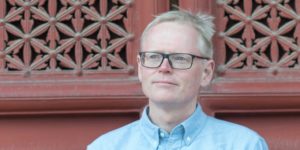
Journalist Ian Johnson, author of The Souls of China: The Return of Religion After Mao, looks at the arrest of 100 participants of the Early Rain Covenant Church and their pastor, Wang Yi, this weekend. Johnson did spend over a year with the underground church and wrote this fast overview for the New York Times.
Ian Johnson
In September, the authorities informed the church that it was in violation of the government’s religious policy, according to a copy of the notice posted by church activists on social media. According to Chinese law, only churches, mosques and temples registered with the government and under government control are considered legal. Others are illegal, even though since the early 1980s, official government policy has been largely to tolerate these sorts of places of worship as long as they are apolitical.
More than half of the estimated 60 million Protestants in China worship at churches like Early Rain that are not registered with the government. They are some of the most dynamic congregations in China, and widely seen as the fastest-growing religious group in the country.
Early Rain is especially prominent because of the role of Pastor Wang. A trained lawyer, Mr. Wang was a well-known blogger and film critic, and in the early 2000s was rated by Chinese media as one of the country’s most prominent public intellectuals. In 2005, he converted to Christianity, part of a wave of interest in the religion by politically active Chinese. He started Early Rain and it quickly grew in size, and now has more than 500 members.
In 2006, Mr. Wang met President George W. Bush at the White House along with two other prominent Christian activists.
Over the past few years, however, the government has made a nationwide effort to more strictly regulate spiritual life in China, reflecting President Xi Jinping’s drive to exert a tighter control over society. In 2016, it enacted new regulations emphasizing that all places of worship must be controlled by the government and banning foreign ties.
Earlier this year it took other steps, such as banning online sales of the Bible, and seeking a deal with the Vatican to normalize relations. The government has also destroyed churches or removed their steeples and crosses.
Steps against Islam, however, have been even more draconian. Hundreds of thousands of minority Muslims have been sent to internment camps in China’s far western region of Xinjiang while others have been banned from fasting during Ramadan.
Ian Johnson is a speaker at the China Speakers Bureau. Do you need him at your meeting or conference? Do get in touch or fill in our speakers’ request form.
Are you looking for more stories by Ian Johnson? Do check out this list.
